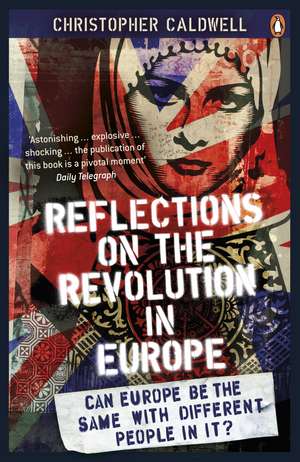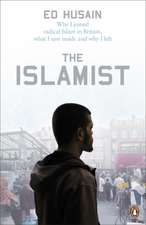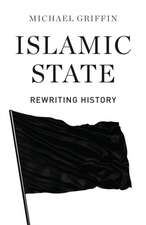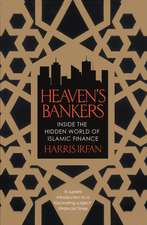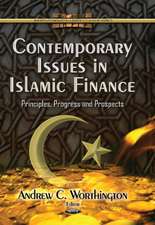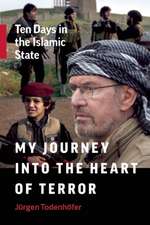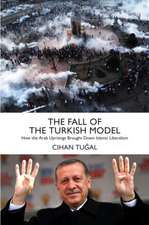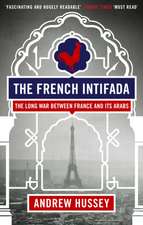Reflections on the Revolution in Europe: Immigration, Islam and the West
Autor Christopher Caldwellen Limba Engleză Paperback – 28 apr 2010
'Western Europe became a multiethnic society in a fit of absence of mind.'
Taking us from English suburbs to Parisian housing estates, this provocative, unflinching and engrossing book tackles uncomfortable questions about immigration and Islam head-on, and asks: why can't we face the truth?
| Toate formatele și edițiile | Preț | Express |
|---|---|---|
| Paperback (2) | 100.89 lei 3-5 săpt. | +11.82 lei 4-10 zile |
| Penguin Books – 28 apr 2010 | 100.89 lei 3-5 săpt. | +11.82 lei 4-10 zile |
| Anchor Books – 30 iun 2010 | 114.60 lei 3-5 săpt. |
Preț: 100.89 lei
Nou
Puncte Express: 151
Preț estimativ în valută:
19.31€ • 19.90$ • 16.30£
19.31€ • 19.90$ • 16.30£
Carte disponibilă
Livrare economică 10-24 februarie
Livrare express 24-30 ianuarie pentru 21.81 lei
Preluare comenzi: 021 569.72.76
Specificații
ISBN-13: 9780141027777
ISBN-10: 0141027770
Pagini: 384
Dimensiuni: 129 x 198 x 22 mm
Greutate: 0.29 kg
Editura: Penguin Books
Colecția Penguin
Locul publicării:London, United Kingdom
ISBN-10: 0141027770
Pagini: 384
Dimensiuni: 129 x 198 x 22 mm
Greutate: 0.29 kg
Editura: Penguin Books
Colecția Penguin
Locul publicării:London, United Kingdom
Notă biografică
Christopher
Caldwell
is
a
columnist
for
theFinancial
Times,
a
contributing
writer
forThe
New
York
Timesand
a
senior
editor
at
theWeekly
Standard.
He
lives
in
Washington,
DC
and
travels
regularly
across
Europe.
He
has
been
described
by
Matthew
d'Ancona
as
'one
of
the
best
journalists
in
the
world'
and
has
been
reporting
on
the
politics
and
culture
of
Islam
in
Europe
for
more
than
a
decade.
Recenzii
Caldwell
is
a
bracing,
clear-eyed
analyst
of
European
pieties
.
.
.
this
book
pulsates
with
ideas
The most rigorous and plainspoken examination of Muslim immigration in Europe to date . . . well researched, fervently argued and morally serious
Dispenses a sharp common sense . . . If his book sharpens a so far sluggish debate, it will have served an important purpose
Reflections on the Revolution in Europewill inspire some readers, infuriate others and leave very few indifferent. That's exactly as it should be - because wherever you stand on this debate, it's one we can't afford to ignore.
The most rigorous and plainspoken examination of Muslim immigration in Europe to date . . . well researched, fervently argued and morally serious
Dispenses a sharp common sense . . . If his book sharpens a so far sluggish debate, it will have served an important purpose
Reflections on the Revolution in Europewill inspire some readers, infuriate others and leave very few indifferent. That's exactly as it should be - because wherever you stand on this debate, it's one we can't afford to ignore.
Extras
Chapter 1: Rivers of Blood
The rights and wrongs of Enoch Powell—How much immigration is there?—Muslim immigration—Europe's population problem—Civilization and decadence— Diversity is overrated—Can you have the same Europe with different people?
Western Europe became a multiethnic society in a fit of absence of mind. Mass immigration began—with little public debate, it would later be stressed—in the decade after the Second World War. Industries and government in Britain, France, Germany, the Low Countries, and Scandinavia set up programs to recruit manpower to their booming postwar economies. They invited immigrants. Some of the newcomers took positions, particularly in heavy industry, that now look enviably secure and well-paid. But others worked in the hardest, most thankless, and most dangerous occupations that European industry had to offer. Many had been loyal colonial subjects, and had even borne arms for European powers.
Europe became a destination for immigration as a result of consensus among its political and commercial elites. Those elites, to the extent they thought about the long-term consequences at all, made certain assumptions: Immigrants would be few in number. Since they were coming to fill short-term gaps in the labor force, most would stay in Europe only temporarily. Some might stay longer. No one assumed they would ever be eligible for welfare. That they would retain the habits and cultures of southern villages, clans, marketplaces, and mosques was a thought too bizarre to entertain.
Almost all of the assumptions with which mass immigration began proved false. As soon as they did, Europe's welcome to the world's poor was withdrawn—at first ambiguously, through the oratory of a few firebrand politicians in the 1960s, then explicitly through hard-line legislation against immigration in the 1970s. Decade in, decade out, the sentiment of Western European publics, as measured by opinion polls, has been resolutely opposed to mass immigration. But that is the beginning, not the end of our story. The revocation of Europe's invitation to immigrants, no matter how explicit it became, did little to stem their arrival. As the years passed, immigration to Europe accelerated. At no point were Europeans invited to assess its long-term costs and benefits.
The rights and wrongs of Enoch Powell
On April 20, 1968, two weeks after the assassination of Martin Luther King Jr. and the race riots that it sparked in Washington and other U.S. cities, the British Tory parliamentarian Enoch Powell made a speech at the Midland Hotel in Birmingham that has haunted the European political imagination ever since. Powell was talking about the arrival, modest up to that point, of "coloured" former colonial subjects, primarily from the Indian subcontinent but also from the Caribbean. At the time, this migration had changed the face of only a very limited number of urban neighborhoods. Powell implied that the long-term consequence would be ghettoes like the ones in America that were burning as he spoke. "We must be mad," he said, "literally mad, as a nation, to be permitting the annual inflow of some 50,000 dependants, who are for the most part the material of the future growth of the immigrant-descended population. It is like watching a nation busily engaged in heaping up its own funeral pyre." Citing the poet Virgil, Powell warned, "I seem to see 'the River Tiber foaming with much blood.'"
Half a year later, in the course of an even more ominous speech to the Rotary Club of London, he warned that, should immigration proceed at the current pace,
"the urban part of whole towns and cities in Yorkshire, the Midlands and the Home Counties would be preponderantly or exclusively Afro-Asian in population. There would be several Washingtons in England. From those whole areas the indigenous population, the people of England, who fondly imagine that this is their country and these are their home-towns, would have been dislodged—I have deliberately chosen the most neutral word I could find. And here for the first time this morning I offer a subjective judgement . . . The people of England will not endure it."
All British discussion of immigration since then has been, essentially, an argument over whether Enoch Powell was right. It has been a sterile argument because those who engage in it tend to mix up two senses of the word right—the moral sense and the factual sense. To say the Emancipation Proclamation is right means something different than to say the Pythagorean theorem is right. Powell's remarks revealed a class-based split over which of these two kinds of rightness is the real business of politics. This split is a feature of all discussions of modern immigration in all countries.
Political elites focused on whether Powell was right morally. Even if most of the fears Powell appealed to were legitimate ones, and even if plenty of evidence can be mustered (such as his passion for India and for Indian languages) to show that Powell was not himself a racist, his speech can be defended against charges of bigotry only by splitting hairs. News coverage ran against him. Tory leader Ted Heath, Powell's archrival within the party, forced Powell to resign his position as shadow defense minister. Morally, Powell was not right.
Popular opinion, though, focused on whether he was right factually. And in this sense, right he was, beyond any shadow of a doubt. Although at the time Powell's demographic projections were much snickered at, they have turned out not just roughly accurate but as close to perfectly accurate as it is possible for any such projections to be: In his Rotary Club speech, Powell shocked his audience by stating that the nonwhite population of Britain, barely over a million at the time, would rise to 4.5 million by 2002. (According to the national census, the actual "ethnic minority" population of Britain in 2001 was 4,635,296.) At a speech during the 1970 election campaign, he told voters in Wolverhampton that between a fifth and a quarter of their city, of Birmingham, and of Inner London would consist of Commonwealth immigrants and their descendants. (According to the 2001 census, Wolverhampton is 22.2 percent, Birmingham 29.6 percent, and Inner London 34.4 percent nonwhite.)
Ordinary Britons loved Powell's Birmingham speech. He received literally vanloads of mail—100,000 letters in the ten days that followed, of which only 800 expressed disagreement. Yet if Powell was right that immigration would increase far beyond what an Englishman of 1968 would have considered tolerable, he was wrong to predict that Englishmen of the next generation would not tolerate it. Although blood has indeed flowed at times—a spate of racist murders of South Asians in the East End of London in the 1970s, a dozen major riots over the decades, and numerous terrorist plots, including the 7/7 transport bombings carried out by Islamist Englishmen of Pakistani descent in 2005—it has not made the rivers foam. What did Powell miss?
One thing he missed was shame. The dominant moral mood of postwar Europe was one of repentance for two historic misdeeds, colonialism and Nazism. It is true that Britain, uniquely among Western European countries, had no cause to feel penitence for having perpetrated, encouraged, or watched passively the outrages of fascism two and three decades before. Britain had, however, recently dissolved, or been chased from, the largest empire in the history of the world, which left most of its citizens feeling embarrassed and diffident. Powell was an exception. A lover of the old Empire, swept up in the romance of it, he had no ear for this dirge of repentance, and no sense that his contemporaries were hearing a different music.
When addressing Africans, Asians, and other would-be immigrants, postwar Europeans felt a sense of moral illegitimacy that deepened as the decades passed. The dominant mood was summed up in The March, a fictional movie that BBC 1 aired for "One World Week" in 1990. In it, a charismatic political leader called El-Mahdi leads a quarter of a million people out of a Sudanese refugee camp on a 3,000-mile march to Europe under the slogan "We are poor because you are rich"—a message the movie made little effort to contradict.
Even those who felt that such shame was misplaced were forced to admit its power. In The Camp of the Saints, the dark 1973 novel of the Frenchman Jean Raspail, a collection of philanthropists and activists incite a million underfed Indians to board a flotilla of rusty ships for Europe, with dire consequences, including the trampling to death of the well-wishers who rush to welcome the disembarking hordes. Raspail's vision captures more of the complexity of the modern world than does The March. Political clashes are provoked not just by simple inequalities but by accidents, the vanity of intellectual elites, and the snowball effect of the mass media. What the BBC's filmmakers saw as conscience, Raspail saw as a mix of cowardice and unintended consequences.
For Powell, as for Raspail, mass migration into Europe was not a matter of individual migrants "looking for a better life," as the familiar phrase goes. It was a matter of organized masses demanding a better life, a desire with radically different political consequences. "It is much nearer to the truth," Powell said, "to think in terms of detachments from communities in the West Indies or India or Pakistan encamped in certain areas of England." Detachments, encampments--these are military metaphors. Powell is wrong to use them. But even if immigrants are not acting collectively, individual decisions to migrate can, in an age of globalization, produce massive collective effects. As the German poet and essayist Hans Magnus Enzensberger wrote in 1992:
"The free movement of capital brings the free movement of labor in its wake. With the globalization of the world economy, which has been fully achieved only in the very recent past, migratory movements will take on a new quality, too. Government-organized colonial wars, campaigns of conquest, and expulsions will most likely be replaced by molecular mass migrations."
If one abandons the idea that Western Europeans are rapacious and exploitative by nature, and that Africans, Asians, and other would-be immigrants are inevitably their victims, then the fundamental difference between colonization and labor migration ceases to be obvious.
How much immigration is there?
Europe is now, for the first time in its modern history, a continent of migrants. Of the 375 million people in Western Europe, 40 million are living outside their countries of birth. In almost all Western European countries, the population of immigrants and their children approaches or surpasses 10 percent. Even the historically poor and backward countries of peripheral Catholic Europe, such as Ireland (14.1 percent immigrant) and Spain (11.1 percent), have become crossroads. Between 2000 and 2005, Ireland's foreign-born population was increasing at an average annual rate of 8.4 percent and Spain's at (what follows is not a typographical error) 21.6 percent a year.
But we must make a sharp distinction. Much of this movement—that part that involves Europeans moving to other European countries—is not really immigration at all. It is a program of increased labor and residential mobility explicitly agreed to, through treaties, by the more than two dozen states that are part of the European Union. The EU's members have pledged themselves to an "ever closer union." The so-called "Schengen agreements," ratified in the decade after 1985, permit free movement of residents across most of Europe's internal borders, with no checks or passport controls.
It is not such a big deal that a third (37 percent) of Luxembourg's residents were born abroad. Virtually all of them were born in the EU: Portugal, France, Belgium, Germany, and Italy are the most important sending countries. Luxembourg is a charter member of the European Union and one of the most loyal. And a Pole who moves to Ireland—as about 63,000 have done since the turn of the century, to the point where 2 percent of the island's population is Polish born—isn't just moving out of one country and into another. He is moving around within a federation.
The EU is not unanimously loved in Europe, and movement between EU countries is not popular—78 percent of Irish people, for instance, want to reimpose restrictions on Eastern European immigration. Such mobility erodes national cultures that have shaped and comforted people for centuries and it does so no matter who is doing the moving. For instance, the Swedish sociologist Åke Daun has often written about how Swedes "like being like each other." Most peoples do, and they have a harder time being so when their countries fill up with people from elsewhere. Preferences for cultural sameness are often about seemingly small matters—say, the pea soup that Swedes traditionally eat on Thursday or a national taciturnity so extreme that, in Sweden, according to Daun, "signaling in traffic is often considered an undesirable expression of aggression." If you are among those Swedes who feel a warm glow when eating pea soup on Thursday or a slight unease when signaling on turns, then immigration can make your life a little bit crummier, because it disrupts those patterns. And this is so even if the immigrants are perfectly upstanding citizens from a neighboring country.
But immigration from neighboring countries does not provoke the most worrisome immigration questions, such as "How well will they fit in?" "Is assimilation what they want?" and, most of all, "Where are their true loyalties?"—culminating in a troubled "Where is this all heading?" Describing intra-European movements as "immigration" can be a useful debating trick for those who wish to short-circuit discussion of the problems of non-European immigration. ("Why are Moroccan slums in Amsterdam a problem, but not German retirement communities in Ibiza?") In this sense, using the word immigration to describe intra-European movements makes only slightly more sense than describing a New Yorker as an "immigrant" to California. Movement between European countries does count as immigration for statistical purposes. But it is not what this book is about.
Muslim immigration
This book concerns a second type of immigration: immigration from non-European countries and cultures. To be more precise, it is about certain problems created by the desire of non-Europeans to settle in Europe for good: the problems of multiethnic and multicultural societies. There have always been Western European countries that contain multiple European peoples with distinct linguistic and cultural identities—Belgium, Britain, Finland, France, Spain, and Switzerland in particular. Intercontinental immigration on the present scale, however, is unheard of. And it is unpopular. In no country in Europe does the bulk of the population aspire to live in a bazaar of world cultures. Yet all European countries are coming to the wrenching realization that they have somehow, without anyone's actively choosing it, turned into such bazaars.
In theory, any profoundly different culture could prove difficult to assimilate into European life. In practice, it is Islam that is posing the most acute problems. For 1,400 years, the Islamic and the Christian worlds have opposed one another, violently at times. We are living through one of those times. And yet, if immigration is somehow structurally or economically necessary to Europe—a proposition that will be examined more closely in the next chapter—it is from the overcrowded Muslim countries of Europe's southern and southeastern perimeter that it is likely to come. Of course, such immigration already has come and is continuing to come.
The rights and wrongs of Enoch Powell—How much immigration is there?—Muslim immigration—Europe's population problem—Civilization and decadence— Diversity is overrated—Can you have the same Europe with different people?
Western Europe became a multiethnic society in a fit of absence of mind. Mass immigration began—with little public debate, it would later be stressed—in the decade after the Second World War. Industries and government in Britain, France, Germany, the Low Countries, and Scandinavia set up programs to recruit manpower to their booming postwar economies. They invited immigrants. Some of the newcomers took positions, particularly in heavy industry, that now look enviably secure and well-paid. But others worked in the hardest, most thankless, and most dangerous occupations that European industry had to offer. Many had been loyal colonial subjects, and had even borne arms for European powers.
Europe became a destination for immigration as a result of consensus among its political and commercial elites. Those elites, to the extent they thought about the long-term consequences at all, made certain assumptions: Immigrants would be few in number. Since they were coming to fill short-term gaps in the labor force, most would stay in Europe only temporarily. Some might stay longer. No one assumed they would ever be eligible for welfare. That they would retain the habits and cultures of southern villages, clans, marketplaces, and mosques was a thought too bizarre to entertain.
Almost all of the assumptions with which mass immigration began proved false. As soon as they did, Europe's welcome to the world's poor was withdrawn—at first ambiguously, through the oratory of a few firebrand politicians in the 1960s, then explicitly through hard-line legislation against immigration in the 1970s. Decade in, decade out, the sentiment of Western European publics, as measured by opinion polls, has been resolutely opposed to mass immigration. But that is the beginning, not the end of our story. The revocation of Europe's invitation to immigrants, no matter how explicit it became, did little to stem their arrival. As the years passed, immigration to Europe accelerated. At no point were Europeans invited to assess its long-term costs and benefits.
The rights and wrongs of Enoch Powell
On April 20, 1968, two weeks after the assassination of Martin Luther King Jr. and the race riots that it sparked in Washington and other U.S. cities, the British Tory parliamentarian Enoch Powell made a speech at the Midland Hotel in Birmingham that has haunted the European political imagination ever since. Powell was talking about the arrival, modest up to that point, of "coloured" former colonial subjects, primarily from the Indian subcontinent but also from the Caribbean. At the time, this migration had changed the face of only a very limited number of urban neighborhoods. Powell implied that the long-term consequence would be ghettoes like the ones in America that were burning as he spoke. "We must be mad," he said, "literally mad, as a nation, to be permitting the annual inflow of some 50,000 dependants, who are for the most part the material of the future growth of the immigrant-descended population. It is like watching a nation busily engaged in heaping up its own funeral pyre." Citing the poet Virgil, Powell warned, "I seem to see 'the River Tiber foaming with much blood.'"
Half a year later, in the course of an even more ominous speech to the Rotary Club of London, he warned that, should immigration proceed at the current pace,
"the urban part of whole towns and cities in Yorkshire, the Midlands and the Home Counties would be preponderantly or exclusively Afro-Asian in population. There would be several Washingtons in England. From those whole areas the indigenous population, the people of England, who fondly imagine that this is their country and these are their home-towns, would have been dislodged—I have deliberately chosen the most neutral word I could find. And here for the first time this morning I offer a subjective judgement . . . The people of England will not endure it."
All British discussion of immigration since then has been, essentially, an argument over whether Enoch Powell was right. It has been a sterile argument because those who engage in it tend to mix up two senses of the word right—the moral sense and the factual sense. To say the Emancipation Proclamation is right means something different than to say the Pythagorean theorem is right. Powell's remarks revealed a class-based split over which of these two kinds of rightness is the real business of politics. This split is a feature of all discussions of modern immigration in all countries.
Political elites focused on whether Powell was right morally. Even if most of the fears Powell appealed to were legitimate ones, and even if plenty of evidence can be mustered (such as his passion for India and for Indian languages) to show that Powell was not himself a racist, his speech can be defended against charges of bigotry only by splitting hairs. News coverage ran against him. Tory leader Ted Heath, Powell's archrival within the party, forced Powell to resign his position as shadow defense minister. Morally, Powell was not right.
Popular opinion, though, focused on whether he was right factually. And in this sense, right he was, beyond any shadow of a doubt. Although at the time Powell's demographic projections were much snickered at, they have turned out not just roughly accurate but as close to perfectly accurate as it is possible for any such projections to be: In his Rotary Club speech, Powell shocked his audience by stating that the nonwhite population of Britain, barely over a million at the time, would rise to 4.5 million by 2002. (According to the national census, the actual "ethnic minority" population of Britain in 2001 was 4,635,296.) At a speech during the 1970 election campaign, he told voters in Wolverhampton that between a fifth and a quarter of their city, of Birmingham, and of Inner London would consist of Commonwealth immigrants and their descendants. (According to the 2001 census, Wolverhampton is 22.2 percent, Birmingham 29.6 percent, and Inner London 34.4 percent nonwhite.)
Ordinary Britons loved Powell's Birmingham speech. He received literally vanloads of mail—100,000 letters in the ten days that followed, of which only 800 expressed disagreement. Yet if Powell was right that immigration would increase far beyond what an Englishman of 1968 would have considered tolerable, he was wrong to predict that Englishmen of the next generation would not tolerate it. Although blood has indeed flowed at times—a spate of racist murders of South Asians in the East End of London in the 1970s, a dozen major riots over the decades, and numerous terrorist plots, including the 7/7 transport bombings carried out by Islamist Englishmen of Pakistani descent in 2005—it has not made the rivers foam. What did Powell miss?
One thing he missed was shame. The dominant moral mood of postwar Europe was one of repentance for two historic misdeeds, colonialism and Nazism. It is true that Britain, uniquely among Western European countries, had no cause to feel penitence for having perpetrated, encouraged, or watched passively the outrages of fascism two and three decades before. Britain had, however, recently dissolved, or been chased from, the largest empire in the history of the world, which left most of its citizens feeling embarrassed and diffident. Powell was an exception. A lover of the old Empire, swept up in the romance of it, he had no ear for this dirge of repentance, and no sense that his contemporaries were hearing a different music.
When addressing Africans, Asians, and other would-be immigrants, postwar Europeans felt a sense of moral illegitimacy that deepened as the decades passed. The dominant mood was summed up in The March, a fictional movie that BBC 1 aired for "One World Week" in 1990. In it, a charismatic political leader called El-Mahdi leads a quarter of a million people out of a Sudanese refugee camp on a 3,000-mile march to Europe under the slogan "We are poor because you are rich"—a message the movie made little effort to contradict.
Even those who felt that such shame was misplaced were forced to admit its power. In The Camp of the Saints, the dark 1973 novel of the Frenchman Jean Raspail, a collection of philanthropists and activists incite a million underfed Indians to board a flotilla of rusty ships for Europe, with dire consequences, including the trampling to death of the well-wishers who rush to welcome the disembarking hordes. Raspail's vision captures more of the complexity of the modern world than does The March. Political clashes are provoked not just by simple inequalities but by accidents, the vanity of intellectual elites, and the snowball effect of the mass media. What the BBC's filmmakers saw as conscience, Raspail saw as a mix of cowardice and unintended consequences.
For Powell, as for Raspail, mass migration into Europe was not a matter of individual migrants "looking for a better life," as the familiar phrase goes. It was a matter of organized masses demanding a better life, a desire with radically different political consequences. "It is much nearer to the truth," Powell said, "to think in terms of detachments from communities in the West Indies or India or Pakistan encamped in certain areas of England." Detachments, encampments--these are military metaphors. Powell is wrong to use them. But even if immigrants are not acting collectively, individual decisions to migrate can, in an age of globalization, produce massive collective effects. As the German poet and essayist Hans Magnus Enzensberger wrote in 1992:
"The free movement of capital brings the free movement of labor in its wake. With the globalization of the world economy, which has been fully achieved only in the very recent past, migratory movements will take on a new quality, too. Government-organized colonial wars, campaigns of conquest, and expulsions will most likely be replaced by molecular mass migrations."
If one abandons the idea that Western Europeans are rapacious and exploitative by nature, and that Africans, Asians, and other would-be immigrants are inevitably their victims, then the fundamental difference between colonization and labor migration ceases to be obvious.
How much immigration is there?
Europe is now, for the first time in its modern history, a continent of migrants. Of the 375 million people in Western Europe, 40 million are living outside their countries of birth. In almost all Western European countries, the population of immigrants and their children approaches or surpasses 10 percent. Even the historically poor and backward countries of peripheral Catholic Europe, such as Ireland (14.1 percent immigrant) and Spain (11.1 percent), have become crossroads. Between 2000 and 2005, Ireland's foreign-born population was increasing at an average annual rate of 8.4 percent and Spain's at (what follows is not a typographical error) 21.6 percent a year.
But we must make a sharp distinction. Much of this movement—that part that involves Europeans moving to other European countries—is not really immigration at all. It is a program of increased labor and residential mobility explicitly agreed to, through treaties, by the more than two dozen states that are part of the European Union. The EU's members have pledged themselves to an "ever closer union." The so-called "Schengen agreements," ratified in the decade after 1985, permit free movement of residents across most of Europe's internal borders, with no checks or passport controls.
It is not such a big deal that a third (37 percent) of Luxembourg's residents were born abroad. Virtually all of them were born in the EU: Portugal, France, Belgium, Germany, and Italy are the most important sending countries. Luxembourg is a charter member of the European Union and one of the most loyal. And a Pole who moves to Ireland—as about 63,000 have done since the turn of the century, to the point where 2 percent of the island's population is Polish born—isn't just moving out of one country and into another. He is moving around within a federation.
The EU is not unanimously loved in Europe, and movement between EU countries is not popular—78 percent of Irish people, for instance, want to reimpose restrictions on Eastern European immigration. Such mobility erodes national cultures that have shaped and comforted people for centuries and it does so no matter who is doing the moving. For instance, the Swedish sociologist Åke Daun has often written about how Swedes "like being like each other." Most peoples do, and they have a harder time being so when their countries fill up with people from elsewhere. Preferences for cultural sameness are often about seemingly small matters—say, the pea soup that Swedes traditionally eat on Thursday or a national taciturnity so extreme that, in Sweden, according to Daun, "signaling in traffic is often considered an undesirable expression of aggression." If you are among those Swedes who feel a warm glow when eating pea soup on Thursday or a slight unease when signaling on turns, then immigration can make your life a little bit crummier, because it disrupts those patterns. And this is so even if the immigrants are perfectly upstanding citizens from a neighboring country.
But immigration from neighboring countries does not provoke the most worrisome immigration questions, such as "How well will they fit in?" "Is assimilation what they want?" and, most of all, "Where are their true loyalties?"—culminating in a troubled "Where is this all heading?" Describing intra-European movements as "immigration" can be a useful debating trick for those who wish to short-circuit discussion of the problems of non-European immigration. ("Why are Moroccan slums in Amsterdam a problem, but not German retirement communities in Ibiza?") In this sense, using the word immigration to describe intra-European movements makes only slightly more sense than describing a New Yorker as an "immigrant" to California. Movement between European countries does count as immigration for statistical purposes. But it is not what this book is about.
Muslim immigration
This book concerns a second type of immigration: immigration from non-European countries and cultures. To be more precise, it is about certain problems created by the desire of non-Europeans to settle in Europe for good: the problems of multiethnic and multicultural societies. There have always been Western European countries that contain multiple European peoples with distinct linguistic and cultural identities—Belgium, Britain, Finland, France, Spain, and Switzerland in particular. Intercontinental immigration on the present scale, however, is unheard of. And it is unpopular. In no country in Europe does the bulk of the population aspire to live in a bazaar of world cultures. Yet all European countries are coming to the wrenching realization that they have somehow, without anyone's actively choosing it, turned into such bazaars.
In theory, any profoundly different culture could prove difficult to assimilate into European life. In practice, it is Islam that is posing the most acute problems. For 1,400 years, the Islamic and the Christian worlds have opposed one another, violently at times. We are living through one of those times. And yet, if immigration is somehow structurally or economically necessary to Europe—a proposition that will be examined more closely in the next chapter—it is from the overcrowded Muslim countries of Europe's southern and southeastern perimeter that it is likely to come. Of course, such immigration already has come and is continuing to come.
Descriere
Descriere de la o altă ediție sau format:
As increasingly assertive immigrant populations shape the continent, Caldwell writes, the foundations of European culture and civilization are being challenged and replaced. This work is destined to become the classic on how Muslim immigration has permanently reshaped the West.
As increasingly assertive immigrant populations shape the continent, Caldwell writes, the foundations of European culture and civilization are being challenged and replaced. This work is destined to become the classic on how Muslim immigration has permanently reshaped the West.
